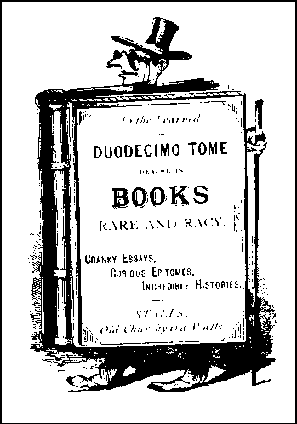The Complete Guide to
Getting Your Poetry Published
Thomas A. Williams
(Sentient)

- Don't forget that as a self-publisher, you are a businessperson. There will be significant financial benefits to you. Tax savings can be substantial.
Williams shows a table called
| Where Submitted | Date | Result |
|---|---|---|
| Little Review | 1/5/99 | "Not right" |
| West Coast Poets | 2/15/99 | "No, but wants to see more" |
| New Yorker | 3/4/99 | Accepted "Staten Island Blues" |
This last item, if it popped up in accounting, would be called "cooking the books," or perhaps, "Enronitus."
Ultimately Williams advises you to publish it yourself. He doesn't like the word "Vanity Press," though. He prefers "Cooperative in cooperative publishing." Well, OK --- but it's still vanity. He does not mention that if you print up 1000 copies of your love-child poems, you could probably spend the rest of you life wondering how to get rid of the 980 turkeys you'll still have under your bed or in the garage after giving 20 to your best friends, family, and fellow-workers.
In Chapter 12, "How to Sell Your Books in Bookstores and Other Retail Outlets," he tells us that B. Dalton and Waldenbooks, "are usually quite willing to display books by local and regional authors." Maybe he is thinking of the B. Dalton in 1895 Austria-Hungary. My local chain book store wouldn't be caught dead carrying a book of local poetry by a local author.
Why? Poetry just don't sell. Furthermore, bookstores claim that they don't have the shelf space. And the sheer burden of working out agreements with the author, keeping record of sales (if any), and dealing with what is essentially small change doesn't interested them at all.
You need proof? Call up some of the big bookstores in your city, ask them if they will please carry your privately printed book of poems. The only chance you have would be for you to change your name to Charles Simic or Edna St. Vincent Millay. With those monikers, you'll be in Hog Heaven. Otherwise, forget it.
Unless you have some secret poetic gene floating around in your blood --- something on the order of the peasant magic of John Clare --- I guarantee that you will spend your dotage looking at boxes of your unsold books, wondering what peabrain thought up this idea called "self-publishing." Or "Poet Power."
There is something else missing here. Something called Art. Writing poetry is like everything else worth doing. You need discipline and knowledge to put the words on paper. The late Jimmy Merrill was up every morning before five writing poetry, and he did it for at least five hours a day. Every morning. He won his spurs. But it was no piece of cake.
Poetry that is worth a shit must come from devilishly hard work, not from being "a businessperson." Stuff that is worth reading must grow out of aches and joy and hate and love, must be prepared and delivered with genius and discipline, must avoid all 5,000 of the all-too-common poetic clichés.
Yet when we look in the index to Poet Power, between "Directory of Poetry Publishers" and "Discount" the word "Discipline" doesn't appear. Not even a whisper of "Art" lies between "Aristotle" and the "Arts council." Between "Subsidy" and "Supersites" there is no "Suffering." Not even a Sigh.
The poetry world is up to here with badly trained amateurs who are going to publish whether the world wants them to or not. If you must, run off fifty Xeroxes of your best stuff, sell it in the public park, give it for free to those that want it, stand there next to the guy on the street-corner with a sign that says
|
Will Sell Poems For Pennies |
|---|
And take that $1,500 - $2,500 you were going to spend on your book of poetry and invest it in something safe like frozen pork bellies. It's a helluva lot more fun, and at least gives you a 50/50 chance for return on invested dollar.
Finally: anyone who puts out a book on self- You might want to store it somewhere else. Like in the recycling bin.